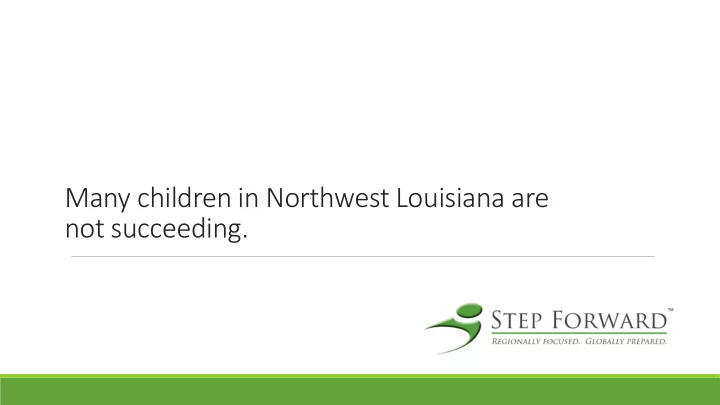

Many children in Northwest Louisiana are not succeeding.
1,141 20% of our NWLA ninth grade students do not graduate on time.
2,478 42% of our NWLA third grade students do not read proficiently.
approximately 3,000 54% of our NWLA kindergarten students are not ready for school .
12,100 32% of our NWLA children under six live in poverty.
A Post- sustainable, Kindergarten Third grade High school secondary reading graduation living-wage readiness training job These interdependent milestones tell us that early intervention is critical.
Children in poverty are especially at risk for poor outcomes. Wagmiller, R., and Adelman, R., (2009). Childhood and Intergenerational Poverty: The Long-Term Consequences of Growing Up Poor. National Center for Children in Poverty. Columbia University. Retrieved from: http://academiccommons.columbia.edu/catalog/ac:126233
One study found that children in poverty may hear 30 million fewer words than more affluent children by age four. Number of Words Addressed 50 40 Millions of Words 30 High Income Middle Income 20 Low Income 10 0 0 12 24 36 48
As a result, they had less than half the vocabulary size of their peers. 1116 words 1200 (children in high income families) ords Total Wor 749 words 600 (children in middle income families) 525 words (children in low 200 income families) 24 16 36 Risley, T., and Hart, B. (1995) Meaningful Differences in the Everyday Experience of Young American Children. Baltimore, Maryland: Paul H. Brooks Publishing Company.
Northwest Louisiana Children - Poverty vs. School Readiness 60% 54% 50% 40% 32% 30% 20% 10% 0% Children Under 6 in Poverty Children Not Kindergarten-Ready Yet, clearly school readiness is a concern for NWLA children of all all socioeconomic backgrounds.
By working together, we can change this.
A 2015 study of 8,650 children found that the size of a two- year old’s vocabulary predicted kindergarten success. To learn more words, children must hear more words. Morgan, P., Farkas, G., Hillemeier, M., Hammer, C., and Maczuga, S. (2015). 24-Month-Old Children With Larger Oral Vocabularies Display Greater Academic and Behavioral Functioning at Kindergarten Entry. Child Development. 86 (5), 1351-1370 .
THE CRITICAL PERIOD
Hearing lots of words: • promotes early brain development • builds a strong vocabulary • provides the essential foundation for academic success.
THE SOLUTION IS SIMPLE (AND FREE.) TALK, READ AND SING
TO CLOSE THE GAP To learn more, go to www.stepforwardnla.org
Recommend
More recommend